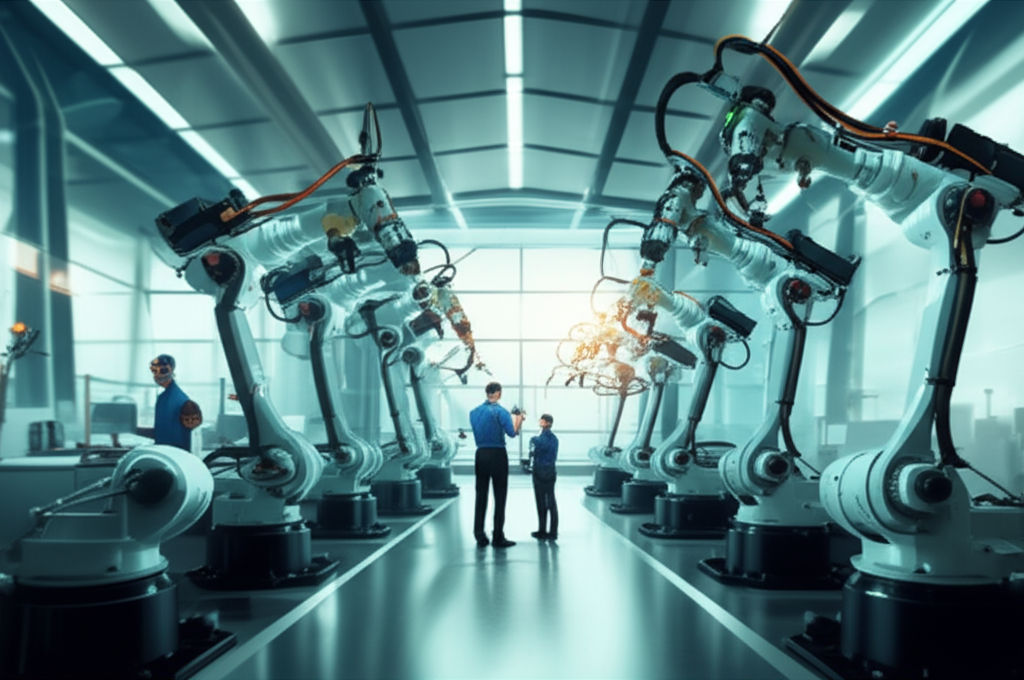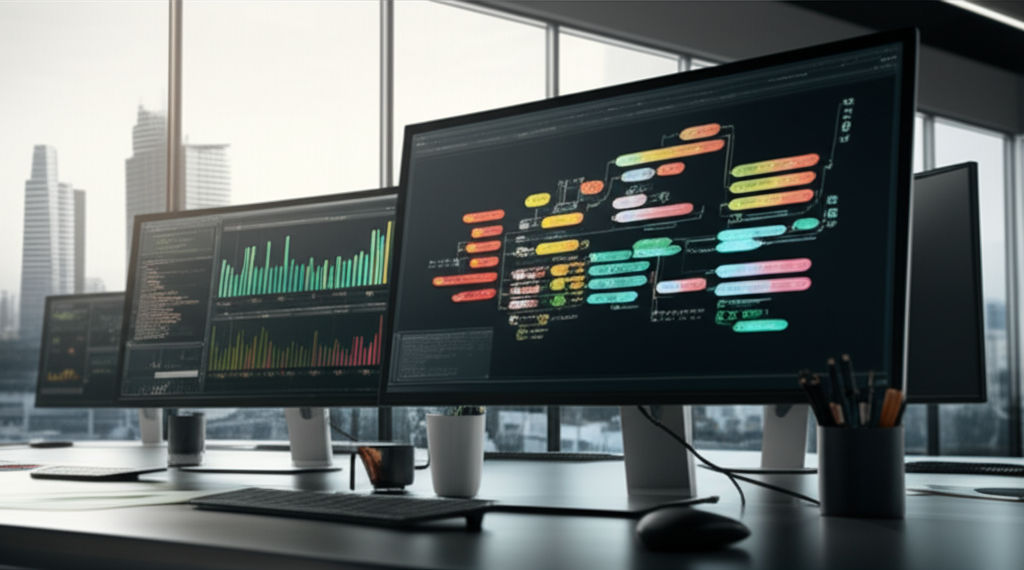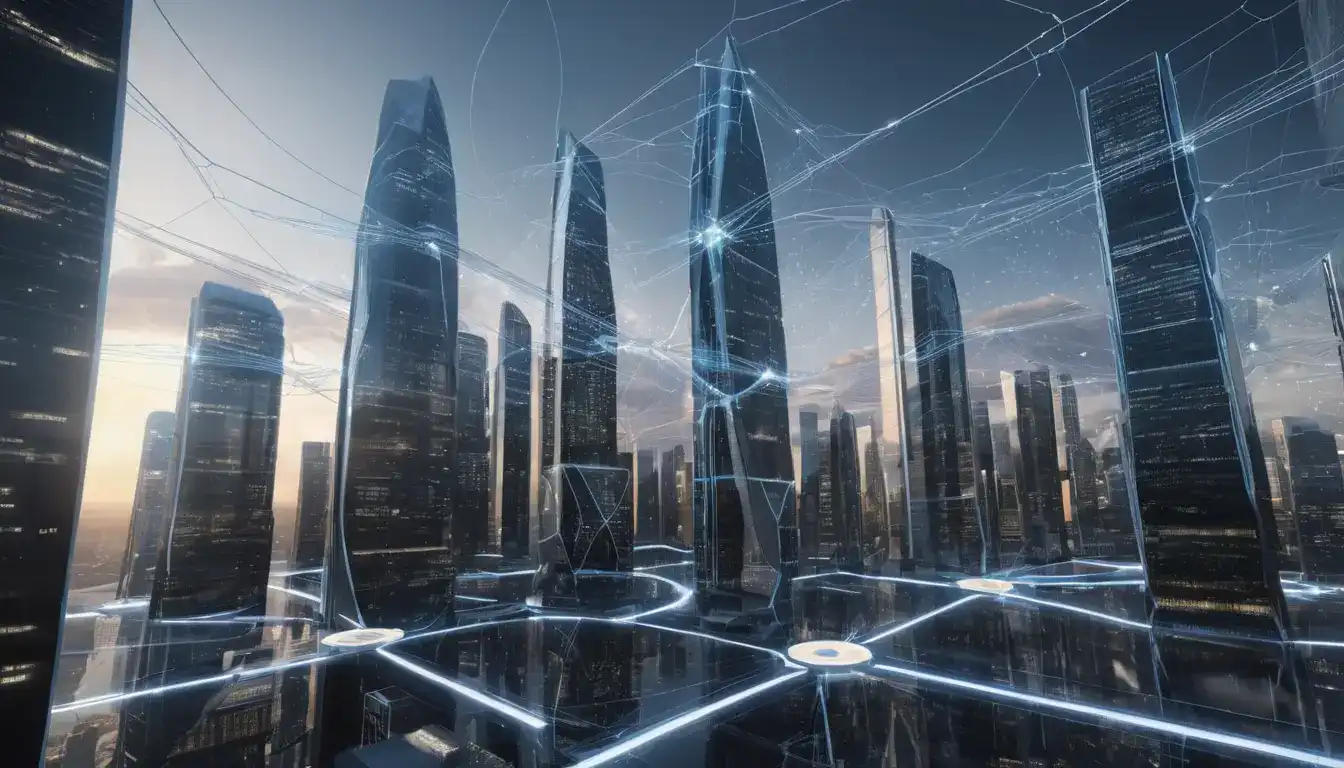Automation's Economic Impact
Emily Willis

Photo: Automation's Economic Impact
The rise of automation, driven by advancements in artificial intelligence (AI) and robotics, is reshaping industries and economies worldwide. This technological evolution promises significant productivity gains and economic growth, but it also presents complex challenges related to job displacement and income inequality. Understanding the multifaceted economic impact of automation is crucial for individuals, businesses, and governments alike as we navigate this transformative era.
The Rise of Automation: A Brief Overview
Automation refers to the use of technology to perform tasks with minimal human intervention. While the concept isn't new, the sophistication and widespread adoption of automation technologies, particularly AI, have accelerated dramatically in recent years. From robotic assembly lines in manufacturing to AI-powered chatbots in customer service, automation is permeating nearly every sector of the global economy.
Historically, automation primarily affected routine, manual tasks. However, with the advent of generative AI, the scope has expanded to impact more complex, knowledge-based jobs, including those in creative content generation, marketing, sales, and even software development. This shift signifies a profound change in the nature of work, prompting both excitement about potential efficiencies and concerns about the future of human labor.
Boosting Productivity and Economic Growth
One of the most compelling arguments for automation is its ability to significantly enhance productivity and drive economic growth. By automating repetitive, time-consuming, and error-prone tasks, businesses can achieve higher output, reduce operational costs, and improve accuracy.
- Increased Efficiency and Output: Automated systems can operate 24/7 without fatigue, leading to higher production rates and consistent quality. For instance, in manufacturing, companies like ZF Group have seen output increase by 40% after automating their transmission manufacturing line, while also reducing material waste by 65% and energy consumption by 28%. Toyota similarly reduced VOC emissions by 40% and energy consumption by 25% through automated painting processes.
- Cost Reduction: Automating tasks can eliminate labor costs associated with manual work, reduce overhead expenses, and minimize errors that can be costly to fix. The U.S. alone loses an estimated $600 billion annually due to data errors, a figure that automation can drastically reduce.
- Innovation and New Products/Services: By freeing up human employees from mundane tasks, automation allows them to focus on higher-value activities that require creativity, problem-solving, and strategic thinking. This can lead to process innovation and the development of entirely new products and services, stimulating consumer demand and fostering economic expansion.
- Significant GDP Contribution: The economic potential of automation, particularly generative AI, is immense. McKinsey research estimates that generative AI alone could add the equivalent of $2.6 trillion to $4.4 trillion annually across 63 use cases, potentially increasing the impact of all artificial intelligence by 15 to 40 percent. Goldman Sachs economists predict that widespread AI adoption could drive a 7% (or almost $7 trillion) increase in global GDP over a 10-year period and lift productivity growth by 1.5 percentage points annually. PwC's research suggests AI could contribute up to $15.7 trillion to the global economy by 2030, with a significant portion coming from increased productivity.
The Shifting Landscape of Work: Jobs and Automation
Perhaps the most debated aspect of automation's economic impact is its effect on employment. The narrative often oscillates between fears of mass job displacement and optimistic predictions of new job creation. The reality is likely a complex interplay of both.
Job Displacement vs. Job Creation
While automation can displace jobs, particularly those involving routine and repetitive tasks, it also creates new roles and transforms existing ones.
- Job Displacement: By 2030, AI might displace 300 million jobs worldwide, which is about 9.1% of all jobs. Other estimates suggest that up to 800 million jobs could be displaced globally by 2030, representing about 30% of the global workforce. Industries like manufacturing have already seen significant job losses due to automation, with approximately 1.7 million manufacturing jobs lost since 2000.
- Job Creation and Augmentation: Despite displacement, automation is also a powerful job creator. The World Economic Forum (WEF) predicted that while automation would displace 75 million jobs by 2022, it would create 133 million new jobs, resulting in a net gain of 58 million jobs globally. More recent WEF reports indicate that by 2025, 85 million jobs will be displaced, but 97 million new jobs will be created. AI is expected to create 20-50 million new jobs globally by 2030, particularly in sectors like healthcare, pharmaceuticals, and other industries.
- Job Transformation: For many existing roles, AI and automation are more likely to complement human work rather than entirely replace it. This means workers will increasingly collaborate with automated systems, focusing on tasks that require uniquely human skills such as creativity, critical thinking, emotional intelligence, and complex problem-solving. For example, in manufacturing, automation strategies are often adopted to improve product quality and quantity, not necessarily to replace employees, but rather to upscale the workforce and meet consumer demands.
The Imperative of Reskilling and Upskilling
Given the evolving nature of work, reskilling and upskilling the workforce becomes paramount. This involves equipping individuals with new skills to adapt to changing job demands and to seize opportunities in emerging fields.
- Addressing Skills Gaps: Companies increasingly view addressing potential skills gaps related to automation and digitalization as a top priority. The World Economic Forum states that half of the world's workforce will need some form of reskilling or upskilling by 2025.
- Successful Programs: Many organizations are investing in learning and development initiatives. For instance, Verizon partnered with JFF and Generation USA to prepare 500,000 individuals for jobs of the future by 2030, with a focus on unemployed or underemployed workers and those facing job displacement due to automation. Siemens launched its SiTecSkills Academy, which has reached over 24,000 participations, focusing on digital and green skills like IoT, AI, and robotics, and boasts a near 100% success rate in reskilling programs, assessing both skill acquisition and job placement.
- Benefits for Employees: Automation can reduce employee stress by taking over manual tasks, leading to a more productive and positive work environment. A significant 90% of knowledge workers believe automation has improved their work lives, allowing them to focus on more meaningful and strategic activities.
Addressing the Challenges: Income Inequality and Ethical Considerations
While the benefits of automation are significant, its potential to exacerbate income inequality and raise ethical questions cannot be ignored.
Widening Income Gaps
Automation can disproportionately benefit high-skilled workers and owners of capital, potentially widening the income gap.
- Skill-Biased Technological Change: Studies suggest that automation contributes significantly to income inequality by replacing less-educated workers in routine tasks, thereby reducing their wages. Research indicates that automation accounts for 50% to 70% of the increase in wage inequality between more- and less-educated workers in the U.S. since 1980.
- Capital vs. Labor: Automation can increase the share of income going to capital at the expense of labor, as some of the productivity gains accrue to capital owners in the form of higher returns to their wealth.
- Global Disparities: Advanced economies, with their stronger infrastructure and skilled workforces, are better positioned to leverage AI's benefits, which could worsen inequality among nations if low-income countries lack the resources to adapt. Some research even warns that multinational companies might relocate operations back to developed countries due to fully automated production systems, potentially reversing decades of economic growth in developing nations that rely on cheap labor.
Ethical and Societal Considerations
Beyond economics, automation raises ethical concerns about data privacy, algorithmic bias, and the very nature of human work and purpose in an increasingly automated world. Policymakers face the challenge of creating frameworks that encourage innovation while ensuring equitable distribution of benefits and protecting vulnerable populations.
Unlocking New Opportunities: Emerging Industries and Innovation
Automation isn't just about optimizing existing processes; it's a powerful catalyst for the creation of entirely new industries and business models.
- New Sectors: The development, deployment, and maintenance of automation technologies themselves create new jobs in robotics engineering, AI development, data science, cybersecurity, and specialized IT support.
- Transformed Industries: Automation is profoundly shaping industries such as healthcare (e.g., AI-powered diagnostics, robotic surgery), transportation and logistics (e.g., autonomous vehicles, optimized route planning), finance (e.g., fraud detection, automated trading), and even agriculture (e.g., precision farming, automated harvesting). These transformations lead to new services, improved efficiency, and enhanced customer experiences.
- Entrepreneurship: The accessibility of automation tools also empowers small businesses and startups to compete with larger companies by streamlining operations and reducing barriers to entry.
Navigating the Future: Strategies for Individuals and Societies
To harness the full potential of automation while mitigating its risks, proactive strategies are essential for both individuals and societies.
For Individuals: Embrace Lifelong Learning and Adaptability
- Continuous Learning: Focus on developing "human-centric" skills that are difficult for machines to replicate, such as critical thinking, creativity, emotional intelligence, complex problem-solving, and adaptability.
- Digital Literacy: Acquire skills in data analysis, basic coding, and understanding how automated systems work, as these will be increasingly relevant across many professions.
- Reskilling and Upskilling: Actively
Latest ✨
View AllYour blueprint for operational efficiency: learn strategies to do more with less, cut costs, boost profits, and achieve lasting business success.
Emily Willis
Adapt & thrive! In a fast-changing world, lifelong learning and innovation are essential. Discover how continuous skill development future-proofs your career &...
Emily Willis
Explore the anatomy of financial crises, from asset bubbles to contagion. Learn why prevention is key for global economic stability.
Emily Willis
Explore economic blocs: powerful alliances shaping global trade, fostering cooperation & competition. Understand their types & impact on your world.
Emily Willis
Business
View All
July 7, 2025
Business Process MonitoringUnlock business excellence with Business Process Monitoring. Get real-time insights to optimize operations, spot issues, and boost efficiency.
Emily Willis

June 9, 2025
Emerging Technologies: Stay AheadUnlock the power of emerging tech like AI & Blockchain. Learn to adapt & thrive in a rapidly changing world with this essential guide.
Emily Willis

August 5, 2024
12 Profitable Service Businesses for Small Cities12 profitable service businesses perfect for small cities. From charming coffee shops to in-demand auto services, unlock the potential of your small city with these lucrative ideas. Learn how to navigate zoning laws, tax incentives, and marketing strategies for success.
Emily Willis
Economy
View AllFiscal policy: The government's powerful tool of taxes & spending that shapes the economy, jobs, and your daily life. Essential citizen guide.
Read MoreExplore economic blocs: powerful alliances shaping global trade, fostering cooperation & competition. Understand their types & impact on your world.
Read MoreUnpack the 17 Sustainable Development Goals (SDGs): a global blueprint addressing poverty, climate change, and inequality for a sustainable future.
Read MoreEntertainment
View All
July 5, 2025
PR Coordinator Entry Level EntertainmentLights, Camera, PR! Your guide to becoming an entry-level PR Coordinator in entertainment. Discover essential skills & a roadmap to your dream career.
Emily Willis

July 6, 2025
EVO Homestead FunEVO Homestead Fun: Embrace the joyful evolution of modern homesteading. Discover sustainable living, practical tips, and fun for the whole family.
Emily Willis

August 5, 2024
Entertainment in Society: Social Impact, Cultural Influence, Economic ContributionsEntertainment is more than just a way to pass the time it has a significant impact on society, culture, and the economy. It promotes empathy, sparks conversations, and drives social change. It reflects and shapes cultural trends, while also preserving traditions. The entertainment industry generates jobs, contributes to economic growth, and drives technological innovation.
Emily Willis
Health
View Allsleep for physical and mental well-being, discussing the benefits of sleep such as physical restoration, brain function, emotional regulation, concentration, and reduced risk of chronic diseases. It explains the different stages of the sleep cycle and provides guidelines for how much sleep individuals of different ages need.
Emily Willis
Maintaining good health involves a balanced diet that provides essential nutrients for the body. A balanced diet includes carbohydrates, proteins, fats, vitamins, minerals, fiber, and water. Benefits of a balanced diet include enhanced energy levels, improved mental health, a stronger immune system, better weight management, reduced risk of chronic diseases, and enhanced digestion. Components of a balanced diet include fruits and vegetables, whole grains, protein sources, dairy or dairy alternatives, and healthy fats. Tips for maintaining a balanced diet include planning meals, portion control, staying hydrated, limiting processed foods, eating mindfully, and including physical activity.
Emily Willis
Unlock a vibrant life! Embrace the gentle power of walking for profound physical and mental health benefits. Accessible to all.
Emily Willis
Trending 🔥
View All
1
2
3
4
5
6
7
8
9
10
Technology
View All
August 4, 2024
The Role of 5G Technology in Revolutionizing Communication
The introduction of 5G technology is set to revolutionize communication by offering faster speeds, lower latency, and increased capacity for connecting devices. This technology will impact various sectors such as healthcare, transportation, and entertainment. 5G enhances communication through faster speeds, lower latency, and increased capacity, enabling applications like remote surgery, autonomous vehicles, and high-quality streaming.

August 5, 2024
How to Choose the Right Cyber Security Solution for Your Business
In today's digital age, businesses face numerous cybersecurity threats and need to protect sensitive data. To choose the right cybersecurity solution, businesses should understand their specific needs, assess potential threats, evaluate different solutions, consider ease of use and integration, evaluate the provider's reputation and support, conduct a cost-benefit analysis, and implement and monitor the solution effectively.

August 5, 2024
The Future of IoT and Its Potential to Improve Quality of Life
The Internet of Things (IoT) is a transformative force that is revolutionizing daily life by connecting devices and enabling them to exchange data autonomously. The growth trajectory of IoT is projected to surpass 75 billion connected devices by 2025, impacting various sectors such as healthcare, smart cities, agriculture, and home automation.

August 4, 2024
Amidst Economic Uncertainty, Businesses Adapt and Innovate for Survival
The business world can be unpredictable, but companies can thrive by embracing adaptation and innovation. Understanding market trends, economic indicators, and global factors is crucial for charting a successful course.




















